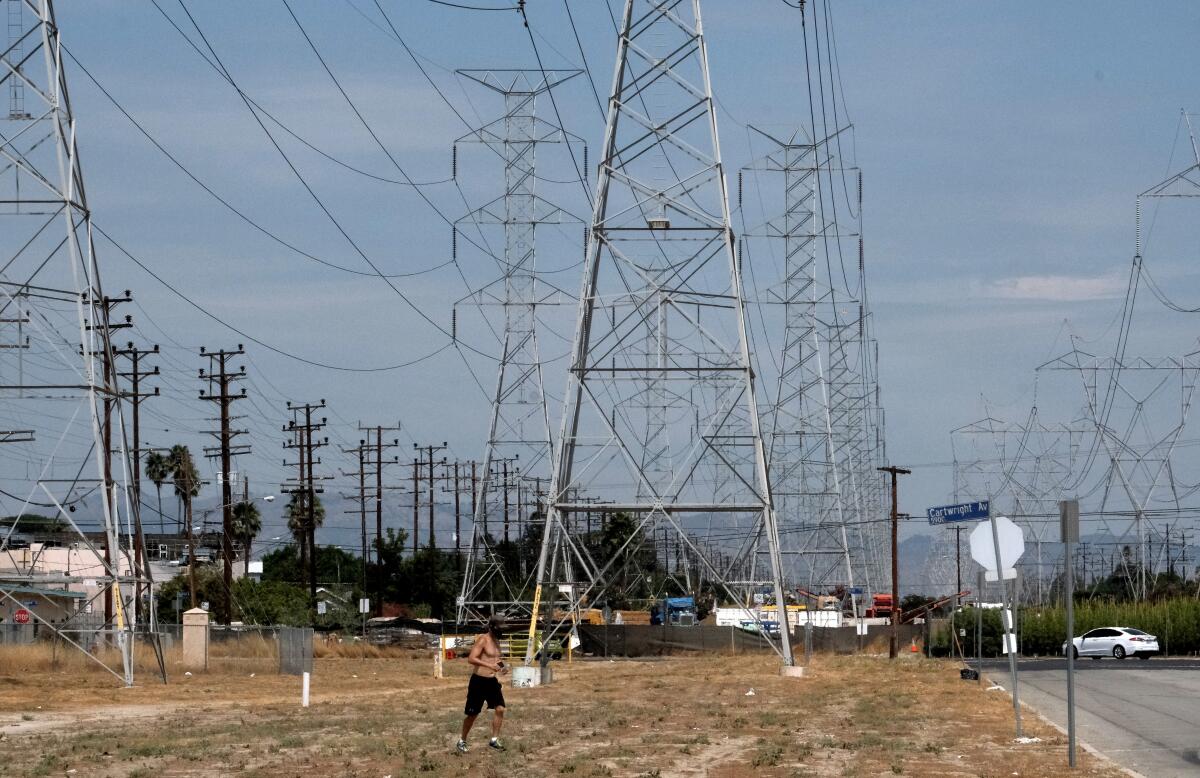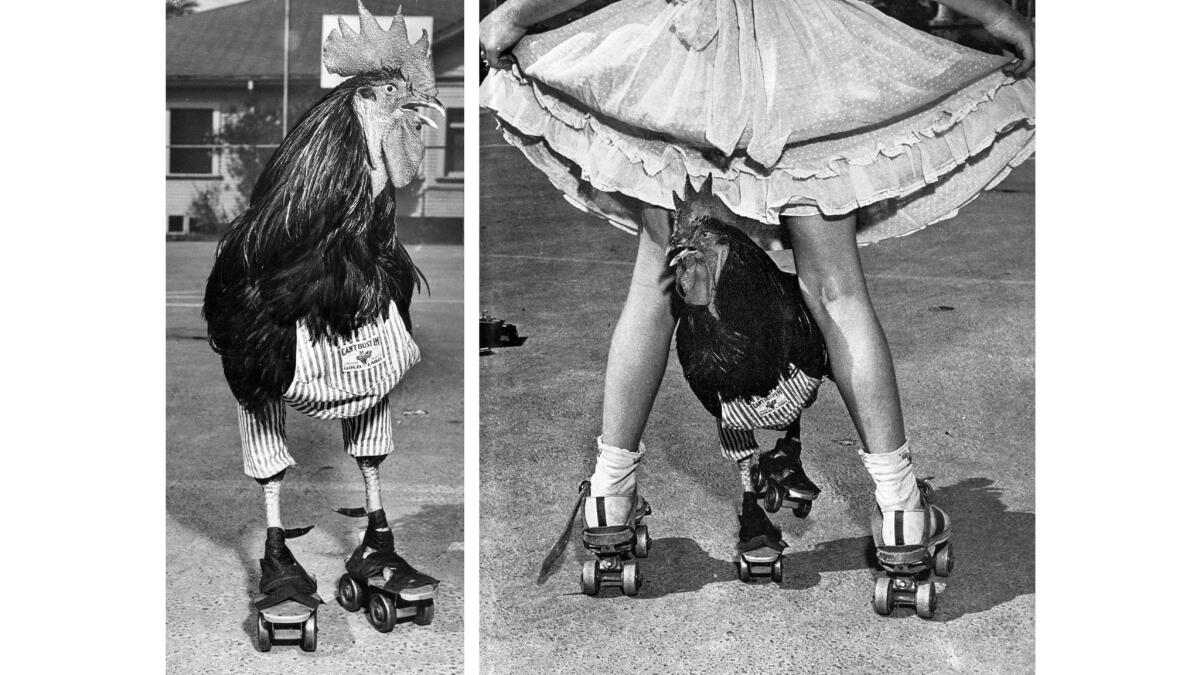Newsletter: California’s power struggles

- Share via
Who’s to blame for California’s rotating blackouts — and are they a warning for the future?
TOP STORIES
California’s Power Struggles
California’s power grid operator described it as a “perfect storm”: scorching temperatures across the western United States, diminished output from renewable energy sources and fossil-fueled power plants affected by the weather, and in some cases plants going offline unexpectedly when electricity was needed most.
Start your day right
Sign up for Essential California for the L.A. Times biggest news, features and recommendations in your inbox six days a week.
You may occasionally receive promotional content from the Los Angeles Times.
The result: rotating power outages in California — the first since the 2001 energy crisis — and warnings of bigger blackouts to come.
Officials at the California Independent System Operator put the blame on the state’s Public Utilities Commission, saying it should have ordered utility companies to line up sufficient power supplies. Asked about the criticism, a spokeswoman for the commission said the agency is “working with our sister agencies to better understand why this occurred.”
Regardless of who’s at fault, the prospect of not only more power shortages but also more intense heat waves looms large. As this week’s high temperatures have broken records, millions are experiencing the havoc that ensues with extreme weather that is growing more frequent with climate change. Scientists say warmer nights in particular have the imprint of global warming and offer a glimpse into California’s future as greenhouse gas emissions gradually heat the planet.
They Want You to Know Joe
Democrats are heading into Day 2 of their four-day national convention today looking, among many objectives, to acquaint voters more with Joe Biden. Why? Because, despite four decades of serving in the public eye, Biden is “well known, but not known well,” as one veteran Democratic pollster puts it.
To that end, the first night consisted of praise for Biden as well as relentless attacks on President Trump’s management of the coronavirus crisis — in an event pushed almost entirely into cyberspace by the pandemic.
Sen. Bernie Sanders, a former Biden rival who has championed the party’s progressive wing, urged every progressive to put aside their differences with Biden and help vote Trump out of office. Former Ohio Gov. John Kasich, a Republican, called Biden a “man for our times.” Former first lady Michelle Obama took top billing, speaking the longest and arguably the most poignantly about the “chaos” Trump has inflicted and the “decency” of Biden.
Here are five takeaways from Monday night.
More Politics
— A look at the issues: On the complicated issue of race, Trump and Biden couldn’t be more different. On healthcare, there’s a huge divide as well.
— Miles Taylor, the former chief of staff at the Department of Homeland Security under Trump, claims in a political ad that the president tried to withhold disaster relief money for California’s wildfires because voters in the state opposed him politically.
— Rep. Adam B. Schiff is dramatically increasing his political fundraising in the wake of his high-profile role in Trump’s impeachment trial and ahead of possible vacancies next year in the U.S. Senate and House Democratic leadership.
Back to School
A new school year like no other begins today in Los Angeles when some 500,000 students in the L.A. Unified School District are expected to sign on and show up at a distance — and for many, at a disadvantage — devoid of the traditional in-person joy of seeing friends and teachers.
Campuses are deserted except for a skeleton staff, but some 30,000 teachers from 1,400 schools will fire up their computers from home, virtually beckoning children to participate in online learning as they test their first daily schedule since mid-March, when the COVID-19 pandemic forced campuses to close.
At the time, educators — in L.A. and throughout the state and the nation — abandoned campuses almost overnight, leaving many families without computers or internet for weeks and exacerbating the academic divide that separates those with resources from those with fewer advantages, including low-income Latino and Black families.
Unlike some school systems, L.A. Unified says it has enough computers and internet hot spots for all — but anxieties remain, fueled in part by the loss of familiar fall rituals.
More Top Coronavirus Headlines
— Kern County has become one of the worst coronavirus hot spots in the nation, with infections spreading rapidly through food processing plants, agricultural communities and other places in Bakersfield and small rural towns. But the response to the crisis has been hampered by growing battles between state and local officials.
— Vague testing guidelines, faulty thermometers and inadequate staff training may have contributed to the COVID-19 outbreak in California prisons that has killed at least 54 inmates and sickened more than 9,500 others, the state’s Office of Inspector General reported Monday.
— California received a batch of mostly positive pandemic-related developments with data showing that the number of people dying of COVID-19 is beginning to decline and hospitalization rates continue to fall steadily.
For more, sign up for Coronavirus Today, a special edition of The Times’ Health and Science newsletter.
The Fight for Equality Continues
Today marks 100 years since the 19th Amendment was ratified, giving women in the U.S. the right to vote.
Women lead House and Senate committees, preside over the House and have been nominees for president and vice president. But according to Rutger’s Center for American Women and Politics, only 359 women have served in the U.S. Congress to date compared with almost 12,000 men. And today, women make up just 23.7% of Congress, which is the largest number in U.S. history; yet that percentage of female lawmakers is less than in nearly every other developed country.
To note the centennial, The Times spoke with female members of the House and Senate about the state of their representation in Congress.
FROM THE ARCHIVES
In 1952, Times photographer Leigh Wiener was sent to the scene of a reported hit-and-run car crash on South Alvarado Street. He found little of note at the scene, only a man who asked him to take his photo, a relatively frequent occurrence. Wiener later wrote that he joked to the man, “Sure, I’ll take you picture, Mister, if you have a dog that can roller-skate.”
The man didn’t have a dog, but he did have a rooster — specifically, a skating rooster. Wiener agreed to meet the bird, named Buster, on his day off, Aug. 17. When he arrived, Buster wore “a clean pair of “You Can’t Bust ‘Em” overalls, and his custom-made roller skates simply shined.” Wiener took Buster’s photo and later photographed him again at an ice rink. Buster could apparently ice skate, too.

Want more of the Los Angeles Times archives? We’re on Instagram.
CALIFORNIA
— Some California cities think they’re safe from sea level rise. They’re not, new data show, because rising groundwater could affect areas once considered less vulnerable to flooding.
— Prosecutors are challenging the Golden State Killer’s apparent frailty, saying he chooses not to show remorse. Meanwhile, victims and survivors will tell their stories in court this week.
— Authorities allege 21 people in Northern California were part of a fraud ring that stole $250,000 by submitting bogus claims on behalf of jail inmates in California’s first major case involving unemployment fraud during the COVID-19 pandemic.
— Health officials have confirmed a case of plague at South Lake Tahoe — the first in California in five years.
Support our journalism
Subscribe to the Los Angeles Times.
NATION-WORLD
— A federal judge blocked the Trump administration from enforcing a new regulation that would roll back healthcare protections for transgender people.
— A former CIA officer has been charged with providing secrets to China over the course of a decade in a case that a top Justice Department official describes as coming straight from a “spy novel.”
— The Trump administration has authorized a sweeping plan to sell drilling rights and spur oil development in Alaska’s Arctic National Wildlife Refuge, setting up a new political clash.
— Officials say a South Korean pastor who defied public health authorities to hold services and massive anti-government rallies despite the COVID-19 pandemic has tested positive for the coronavirus.
— In Belarus, workers are striking in protest of authoritarian President Alexander Lukashenko. Analysts say it might prove to be a tipping point in a week-old uprising.
HOLLYWOOD AND THE ARTS
— HBO’s “I May Destroy You” has a lot going for it, from strong writing to a fresh perspective. It’s also got a great soundtrack, writes pop music critic Mikael Wood.
— News media first introduced artist and writer Chanel Miller to the world as Emily Doe: the woman in the sexual assault case People of the State of California v. Brock Allen Turner, discovered unconscious behind a dumpster at Stanford University. Now she’s making her art world debut at the Asian Art Museum.
— “WAP,” the raunchy hip-hop single by rappers Cardi B and Megan Thee Stallion, has broken streaming records on its way to the No. 1 spot on the Billboard Hot 100.
— How L.A.’s Natural History Museum is celebrating the 100th anniversary of women’s suffrage.
BUSINESS
— California’s $330-million tax credit program, recently renewed by Gov. Gavin Newsom, has agreed to support nine new movies that will be filmed in the state — including one starring Ryan Gosling and Chris Evans.
— Wage theft plagues L.A. garment workers. Why aren’t fashion retailers held responsible? Advocates say change is needed, and they’re proposing the industry’s biggest reforms in a generation.
SPORTS
— Shane Thomas, an All-City soccer player at Palisades High, died at a park in Chino Hills while at a training session with his club team for the upcoming season. He was 17.
— The Washington Football Team hired Jason Wright as team president, making him the first Black person to hold that position in NFL history.
Free online games
Get our free daily crossword puzzle, sudoku, word search and arcade games in our new game center at latimes.com/games.
OPINION
— Now Trump is pandering to NIMBYs, and The Times’ editorial board has a word for it: Sad!
— With Kamala Harris as Biden’s vice president pick, Gavin Newsom’s White House hopes may have stalled, writes columnist George Skelton.
WHAT OUR EDITORS ARE READING
— Did you know that most child abductions happen within families? Corporate kidnappers do — and how much money there is to be made off stressed-out parents. (New York Times)
— Shark researcher Catherine Macdonald details the misogyny, discrimination, harassment, assault and bullying faced by female members of her profession. (Scientific American)
ONLY IN CALIFORNIA
How hot is it? Temperatures in Death Valley were recorded at a blistering 130 degrees on Sunday — possibly the highest mercury reading on Earth in almost 90 years. The National Weather Service recording, which is awaiting confirmation, is among the top three highest temperatures ever measured in Death Valley, as well as the highest temperature seen there during the month of August, according to park and weather service data.
Comments or ideas? Email us at headlines@latimes.com.
Sign up for Essential California
The most important California stories and recommendations in your inbox every morning.
You may occasionally receive promotional content from the Los Angeles Times.






